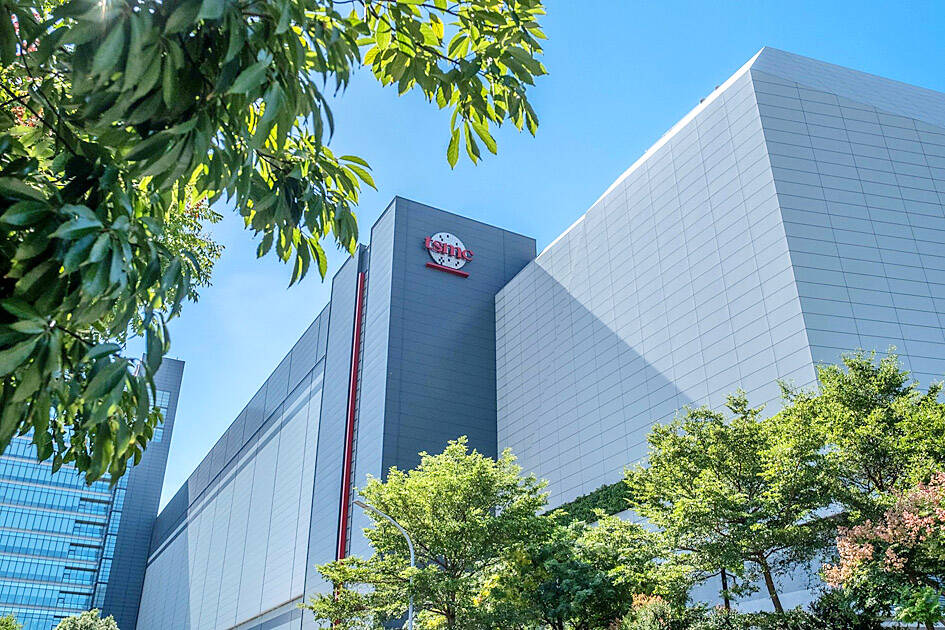Taiwan Semiconductor Manufacturing Co (TSMC, 台積電) is in talks with partners to spend as much as 10 billion euros (US$11 billion) to build a chipmaking fab in Saxony, Germany, people familiar with the matter said.
The planned venture between TSMC, NXP Semiconductors NV, Robert Bosch GmbH and Infineon Technologies AG would include state subsidies and would have a budget of at least 7 billion euros, with the total investment likely closer to 10 billion euros, the people said, asking not to be identified because the information is private.
A final decision has not been made and the plans could still change, they said.

Photo: Lam Yik Fei, Bloomberg
TSMC is still evaluating the feasibility of building a plant in Europe, spokeswoman Nina Kao (高孟華) said, without elaborating.
Spokespeople for NXP, Bosch, Infineon and the German Ministry for Economic Affairs and Climate Action declined to comment on the project.
TSMC chairman Mark Liu (劉德音) told shareholders in 2021 that the firm had started assessments on setting up manufacturing operations in Germany, Europe’s largest economy.
The proposed European plant would focus on chips for the automotive sector, TSMC chief executive C.C. Wei (魏哲家) has said.
Similar projects in Germany have sought as much as 40 percent of their funding from subsidies as the EU attempts to double its share of global semiconductor production by 2030.
Last month, the EU passed the 43 billion euros Chips Act to boost domestic output after supply chain disruptions during the COVID-19 pandemic, and as tensions between the US and China escalate.
Any state aid would require approval from the European Commission, and the consortium is in talks with officials over the size of the package, the people said.
In Japan, where TSMC is spending US$8.6 billion with partners to build a plant, it would receive about half of the funding from the government.
The German facility, which TSMC could approve as soon as in August, would focus on producing 28-nanometer chips, some of the people said. If built, it would be the company’s first fab in the EU.
On Tuesday, Infineon broke ground on a semiconductor fab in Dresden, a city in Saxony that also hosts production facilities for GlobalFoundries Inc and Bosch.
Chipmakers tend to build plants in clusters, so that the expensive facilities can take advantage of infrastructure and workers that are already there.

The US dollar was trading at NT$29.7 at 10am today on the Taipei Foreign Exchange, as the New Taiwan dollar gained NT$1.364 from the previous close last week. The NT dollar continued to rise today, after surging 3.07 percent on Friday. After opening at NT$30.91, the NT dollar gained more than NT$1 in just 15 minutes, briefly passing the NT$30 mark. Before the US Department of the Treasury's semi-annual currency report came out, expectations that the NT dollar would keep rising were already building. The NT dollar on Friday closed at NT$31.064, up by NT$0.953 — a 3.07 percent single-day gain. Today,

‘SHORT TERM’: The local currency would likely remain strong in the near term, driven by anticipated US trade pressure, capital inflows and expectations of a US Fed rate cut The US dollar is expected to fall below NT$30 in the near term, as traders anticipate increased pressure from Washington for Taiwan to allow the New Taiwan dollar to appreciate, Cathay United Bank (國泰世華銀行) chief economist Lin Chi-chao (林啟超) said. Following a sharp drop in the greenback against the NT dollar on Friday, Lin told the Central News Agency that the local currency is likely to remain strong in the short term, driven in part by market psychology surrounding anticipated US policy pressure. On Friday, the US dollar fell NT$0.953, or 3.07 percent, closing at NT$31.064 — its lowest level since Jan.

The New Taiwan dollar and Taiwanese stocks surged on signs that trade tensions between the world’s top two economies might start easing and as US tech earnings boosted the outlook of the nation’s semiconductor exports. The NT dollar strengthened as much as 3.8 percent versus the US dollar to 30.815, the biggest intraday gain since January 2011, closing at NT$31.064. The benchmark TAIEX jumped 2.73 percent to outperform the region’s equity gauges. Outlook for global trade improved after China said it is assessing possible trade talks with the US, providing a boost for the nation’s currency and shares. As the NT dollar

The Financial Supervisory Commission (FSC) yesterday met with some of the nation’s largest insurance companies as a skyrocketing New Taiwan dollar piles pressure on their hundreds of billions of dollars in US bond investments. The commission has asked some life insurance firms, among the biggest Asian holders of US debt, to discuss how the rapidly strengthening NT dollar has impacted their operations, people familiar with the matter said. The meeting took place as the NT dollar jumped as much as 5 percent yesterday, its biggest intraday gain in more than three decades. The local currency surged as exporters rushed to